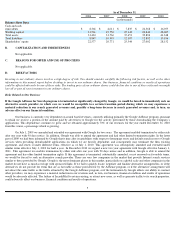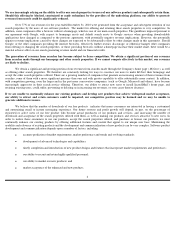Incredimail 2010 Annual Report Download - page 20
Download and view the complete annual report
Please find page 20 of the 2010 Incredimail annual report below. You can navigate through the pages in the report by either clicking on the pages listed below, or by using the keyword search tool below to find specific information within the annual report.
There is direct competition between web-based software and downloaded software.
There are different advantages and disadvantages to web-based software as compared to downloaded software. Currently, web-
based
software seems to be growing at a faster rate than downloaded software. Our business is currently reliant on the continued prevalence of
downloaded software. If there were to be a more dramatic shift to web-
based software this could cause a decrease in the distribution of our
software and subsequently in our revenues.
The Internet and Internet companies are providing an increasing number of services for free.
The internet and internet based companies are providing an increasing number of services for free, including email clients and anti-
spam software and services. A substantial part of our revenues comes from selling software products and services, currently accounting for
approximately 18% of our revenues. We attribute part of the decline in our revenues from the sale of products and services to this trend. Should
this trend accelerate or even continue for a prolonged period, this would cause our revenues from product sales and services to decrease even
more.
New laws and regulations applicable to e-
commerce, Internet advertising, privacy and data collection, and uncertainties regarding the
application or interpretation of existing laws and regulations, could harm our business.
Our business is conducted through the Internet and therefore, among other things, we are also subject to the laws and regulations that
apply to e-
commerce. These laws and regulations are becoming more prevalent in the United States, Israel and elsewhere and may impede the
growth of the Internet or other online services. These regulations and laws may cover taxation, user privacy, data protection, pricing, content,
copyrights, electronic contracts and other communications, Internet advertising, consumer protection, the provision of online payment services,
broadband residential Internet access, and the characteristics and quality of products and services.
Many areas of the law affecting the Internet remain largely unsettled, even in areas where there has been some legislative action. There
is an uncertainty regarding the level of enforceability of different laws of countries in which the Company's products are being used. Therefore it
is difficult to determine whether and how existing laws, such as those governing intellectual property, privacy and data protection, libel, data
security and taxation, apply to the Internet and our business. The US administration recently called for the creation of a Privacy Policy Office
that would help develop an Internet "privacy bill of rights" for US citizens and coordinate privacy issues globally. The US Commerce
Department’s prepared a report recommending a "framework" to protect people from a burgeoning personal data-
gathering industry and
fragmented US privacy laws that cover certain types of data but not others. New laws and regulations may seek to impose additional burdens on
companies conducting business over the Internet. We are unable to predict the nature of the limitations that may be imposed.
For example, legislation has been enacted to regulate the use of "cookie" technology. Upon installation of our software, certain cookies
generated by us and our advertisers are placed on our customers’
computers. It has been argued that Internet protocol addresses and cookies are
intrinsically personally identifiable information that is subject to privacy standards. We cannot assure you that our current policies and
procedures would meet these restrictive standards.
In addition, technology is changing constantly and data security regulations and standards are in a state of flux. Changes in law or
regulations may require that we materially change the way we do business. For example, we may be required to implement physical,
administrative and technological security measures different from those we have now, such as different data access controls or encryption
technology. We may incur substantial expenses in implementing such security measures.
In addition, although current decisions of the U.S. Supreme Court restrict the imposition of obligations to collect state and local sales
and use taxes with respect to sales made over the Internet, the U.S. Congress and a number of states have been considering or have adopted
various initiatives that could limit or supersede these decisions. If any of these initiatives result in a reversal of the Court’
s current position, we
could be required to collect sales and use taxes on our U.S. sales. The imposition by state and local governments of various taxes upon Internet
commerce could create administrative burdens for us and could decrease our future sales.
The EU has already enacted legislation regarding Value Added Tax imposed on certain software sold by companies outside the EU to
consumers in the EU over the Internet. This legislation could be interpreted to include other parts of the Company’
s business not yet accrued for
by the Company, causing additional significant tax exposure, or alternatively, reduce the competitiveness of the Company’
s pricing of its
products.
14
























